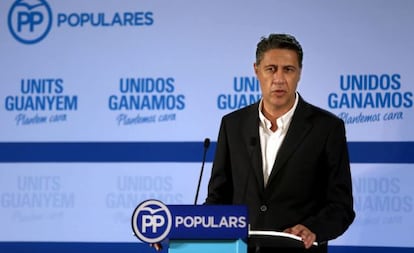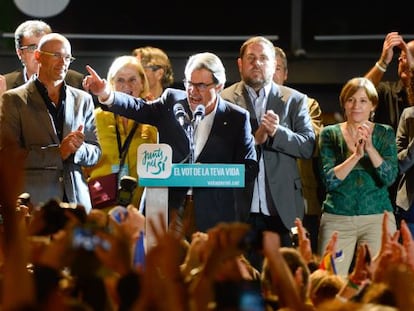PM to hold firm on approach toward Catalonia despite PP’s poor results
Center-right party positioning itself as the only group that can guarantee the unity of Spain


The Popular Party (PP) lost 128,700 votes and eight seats at the Catalan parliament following the regional elections held in the region on Sunday.
But the center-right party had already been expecting such a scenario, and Prime Minister Mariano Rajoy is not going to make any changes to his rhetoric despite the defeat at the polls.
Rajoy has been insisting that there is no need to change the Spanish Constitution to accommodate any new form of relationship between the central government and the northeastern region, where the pro-independence parties secured an absolute majority.
Instead, the conservative ruler is holding up the fact that pro-independence groups Junts pel Sí (Together for Yes) and CUP did not technically achieve a majority of votes in Catalonia (47.8 percent), despite earning 72 seats thanks to the Spanish electoral system of proportional representation, which makes some votes worth more than others.
In fact, the PP’s only real goal had been not to fall under two-digit representation in the regional parliament, which it barely achieved with its 11 representatives. By comparison, in 2012 the conservatives secured 19 seats.
But this time the PP had tough competition from anti-independence Ciudadanos, a party that had been present for years in Catalonia but which made the jump to national politics this year with a view to the general elections coming up in December.
Ciudadanos’ tremendous performance on Sunday, with 25 seats in the Catalan parliament, confirms that it is a real contender for the upcoming general elections.
The PP’s performance puts it on a level with Catalunya Sí es que Pot, a leftist coalition that includes the anti-austerity Podemos, and which also opposes independence.
Rajoy’s attitude throughout his term in office has been one of frontal opposition to any concessions to Catalonia. In the summer of 2012 he rejected a plea by Catalan premier Artur Mas to draft a new fiscal deal that would give his region greater financial powers, along the lines of the Basque Country.
Relations broke down after that, and Mas’ subsequent independence drive only exacerbated the differences between both leaders, who have barely spoken since.
And Sunday’s results are unlikely to change anything.
“We are going to continue to guarantee legality, we are going to keep defending the unity of Spain, and telling Spaniards to rest assured that the government continues to guarantee the rule of law and democracy in Spain,” said PP communications official Pablo Casado. “Evidently, in Catalonia everything remains the same.”
Tu suscripción se está usando en otro dispositivo
¿Quieres añadir otro usuario a tu suscripción?
Si continúas leyendo en este dispositivo, no se podrá leer en el otro.
FlechaTu suscripción se está usando en otro dispositivo y solo puedes acceder a EL PAÍS desde un dispositivo a la vez.
Si quieres compartir tu cuenta, cambia tu suscripción a la modalidad Premium, así podrás añadir otro usuario. Cada uno accederá con su propia cuenta de email, lo que os permitirá personalizar vuestra experiencia en EL PAÍS.
En el caso de no saber quién está usando tu cuenta, te recomendamos cambiar tu contraseña aquí.
Si decides continuar compartiendo tu cuenta, este mensaje se mostrará en tu dispositivo y en el de la otra persona que está usando tu cuenta de forma indefinida, afectando a tu experiencia de lectura. Puedes consultar aquí los términos y condiciones de la suscripción digital.









































